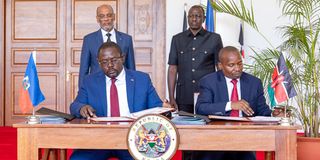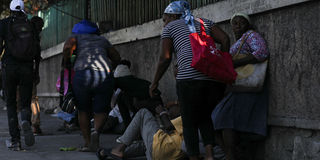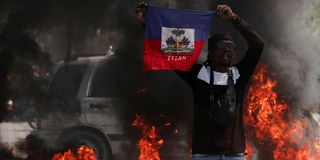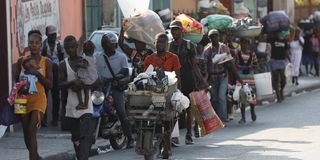Premium
Tough times for visiting Haiti PM Ariel Henry as gang warns against his return

President Ruto and Haiti PM Ariel Henry witnessed the signing ceremony in State House Nairobi.
What you need to know:
- It was raining chaos in Haiti by yesterday, with various news outlets reporting wanton destruction.
- Haiti was the first black-majority country to be independent, yet it has also been largely unstable.
In a succinct illustration of jumping from the frying pan, Haitian Prime Minister Ariel Henry is in Nairobi to sign a reciprocal agreement when it is raining fire and brimstone in his country.
A coalition of gangs wants to capture his ministers and the country’s police chief with the aim of making his return impossible.
That might translate into an exile in Kenya for Dr Henry, who rose to power in 2021 after the assassination of President Jovenel Moïse.
The gangs are led by Jimmy Chérizier, alias Barbecue.
The Haiti Libre quoted him saying: “Today, February 29, 2024, we launch the battle that must overthrow the prime minister and his government. This is our first objective. We must stop them and send them to join Ariel Henry where he is so that he never returns to the country.”
It was raining chaos in Haiti by yesterday, with various news outlets reporting wanton destruction even as Kenya became part of the reports because of Dr Henry’s visit and it plans to send police to bring order in the war-torn country, where gangs control over 80 per cent of the capital.

People flee as police officers clash with gangs during a protest against Prime Minister Ariel Henry's government and insecurity, in Port-au-Prince, Haiti March 1, 2024.
Times without number, the Dr Henry has announced elections, but none has happened since he took power. Haiti currently has no elected officials.
The Haiti Libre reported that on Thursday, the capital was the subject of coordinated gang attacks.
“All activities were paralysed. Schools, businesses and public institutions closed their doors. Shootings were heard throughout the capital and its surroundings, the provisional human toll was heavy and the damage significant.”
The violence had taken some lull recently. It is indicative of the opportunism that punctuates Haiti’s security and political scene. Back in 2022, countries such as the UK, Canada and the US imposed sanctions on Barbecue for “serious human rights abuses”. His assets, dealings and other engagements with entities from these countries were frozen.
Haitian gang leaders
And the UN took a cue, imposing more sanctions on Haitian gang leaders in December last year. The gangs have fronted an argument that foreign security missions deployed in Haiti would be illegal and unwelcome, even though their reign is no better alternative.
If Dr Henry safely returns to Haiti, it would be a small victory for him, especially given that the airport was also attacked by the gangs.
On Friday, President William Ruto said the signing of the bilateral arrangement signalled Kenya’s “historic duty because peace in Haiti is good for the world as a whole”.
This agreement was part of a court-ordered regulation after the High Court found that there had been no bilateral arrangement to make it legal for police deployment abroad.
Kenya will now have to submit the agreement to Parliament for ratification and present it to the Court of Appeal before they can begin redeploying — if the court overturns an earlier nullification by the High Court.
How did Kenya get ‘close’ to Haiti? “Kenya associates itself with the people of Haiti because of our common heritage,” Dr Ruto said on Thursday.

A demonstrator holds up a Haitian flag during a protest against Prime Minister Ariel Henry's government and insecurity, in Port-au-Prince, Haiti March 1, 2024.
“We are offering the experience and expertise of our police officers on the Multinational Security Support Mission (MSS) in Haiti as mandated by the United Nations Security Council and as guided by our courts.”
Haiti had no direct historical ties to Nairobi, except that the two countries both belong to the Organisation of African, Caribbean and Pacific States.
Kenya and Haiti did not even have diplomatic relations until September last year.
Haiti has been independent since 1804. It was the first black-majority country to be independent, yet it has also been largely unstable, recording 33 coups and coup attempts, as well as four assassinations of presidents.
So, when the US reached out to Kenya, it was an opportunity to support “a great friend and true sibling,” as Dr Ruto put it at the UN General Assembly last year.
“Kenya is ready to play its part in full, and join with a coalition of other nations of goodwill – and there are many – as a great friend and true sibling of Haiti,” Ruto said.
Kenya’s image was elevated further after President Joe Biden lobbied for Nairobi’s lead role. He praised Dr Ruto for his “willingness to serve as lead nation of the UN security support mission” to Haiti. “The people of Haiti cannot wait much longer,” he said.
The US has pledged some $200 million in direct financial and technical support for the MSS.

People flee their homes as police confront armed gangs after prominent gang leader Jimmy Cherizier called for Haiti's Prime Minister Ariel Henry's government to be toppled, in Port-au-Prince, Haiti, February 29, 2024.
That financial certainty and a chance to market itself abroad become irresistible. And Nairobi banked on its previous military deployments under the UN, abroad, to argue its case.
Except that the Haiti one was a police deployment, which has not happened before under this kind of arrangement.
Nairobi found a needy Haiti, however. With ‘federated’ gangs roiling the security, Haiti’s government has been unable to bring any sense of safety. When violence last erupted, some 300 people died in a week.
The violence on Thursday and yesterday could bring a higher toll. A UN report said 1,860 people were reported killed, injured or kidnapped in Haiti from April to June last year alone, a 14 per cent increase from the first quarter of 2023.
Police mission
Yet, ordinary people seem divided on whether a foreign police mission is necessary. Haiti’s 10,000-strong police service (PNH) serves 11 million people.
Two months before the UN Security Council passed Resolution 2699 to authorise deployment, local business lobbies surveyed general attitudes towards such a mission. They found that seven in every 10 people support the deployment.
A report by the Alliance for Risk Management and Business Continuity, a lobby that identifies the risks for investments in Haiti, said many of the 1,387 people surveyed felt PNH was incapable of dealing with gangs.
“The majority of respondents (around 60 per cent) felt that the PNH alone was not capable of restoring security in the country. As for the PNH's ability to solve the problem of the proliferation of armed gangs in the country, 56 per cent of respondents expressed a lack of confidence in the PNH,” the report said.
“Sixty-three per cent of Haitians believe it is necessary to deploy an international force to help guarantee security.”
The report, however, left it to competent Haitian authorities to decide what international help to come in.
However, given the lack of political stability, countries deploying police will have to walk the entire land. As it is, Haiti will decide where the foreign missions can use force. It will also be required to cooperate with the MSS.
Besides Kenya, Benin, Antigua and Barbuda, and Spain had pledged to send personnel. Canada, France and the UK pledged to support the mission too.
But the UN Secretary-General created a fund to which donors can send money. The troops will deploy initially for a year, subject to renewal of mandate by the UN Security Council.
Additional reporting by Hillary Kimuyu






